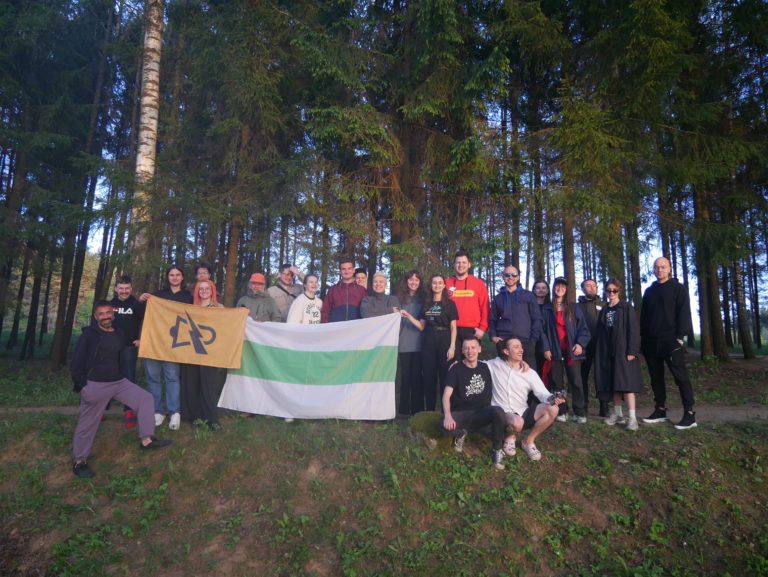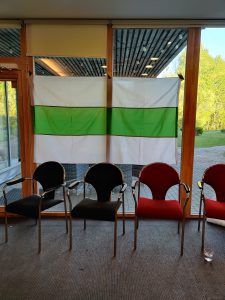Risto Mikkonen shared his impressions about his participation in the School of Humane Drug Policy, organized by Legalize Belarus
Risto Mikkonen, a representative of The Turku Region Cannabis Association, was invited as a speaker at the School of Humane Drug Policy, which took place from May 9 to 13 in Lithuania. He shared his impressions of the event and told how it was.

I arrived at Vilnius airport on Friday morning, May 10, on my way to the School of Humane Drug Policy organized by the Legalize Belarus. It was raining, and I was waiting in the almost empty hall of the airport. The phone rang. This was the man appointed to meet me, waiting for me in front of the hall door. He was the first activist I met who escape Belarus, twelve years ago when he was less than 20 years old.
I have been invited to tell about the initiative of Finnish cannabis activists at the conference center near Vilnius. Accession to the European Union in 1995 brought the Western concept of human rights to the basis of Finnish drug policy. The membership in the European Union also brought the citizens initiative innovation to Finnish politics in 2012. Its purpose was to give citizens more possibilities to influence politics. Our campaign to decriminalize the use of cannabis showed the advantages and disadvantages of this innovation.
There were guests from Georgia, Poland, Latvia, Ukraine, the Czech Republic and a group of people who still living in Belarus. The atmosphere of the weekend was very international with English and Russian as the connecting languages.
Those who came to the school from Belarus had a special symbol on their name tag indicating that they are not allowed to be photographed.If information about their participation becomes known to the Belarusian authorities, this could become a big problem. Lukashenka’s dictatorship is really brutal, which apparently is still not understood in Western countries.
The weekend lectures dealt with human rights, substance classifications, harm reduction policy, presentation of national situations.

The title of the lecture I presented was «Successful decriminalization/legalization. Ways of legislative changes at the national level». I mentioned that we have not yet legalized or even decriminalized cannabis for adults, but in 2006 it became legal for patients.
I talked a little about the origins of Finnish drug policy and the history of the Finnish Cannabis Association. I focused on methods of successful initiatives, the opportunities they provide to influence the cannabis and drug policy debate in general. After the decriminalization initiative reached the 50,000 signature mark, this topic became widely discussed in the media. This flood of stories lasted for a couple of years, which expanded the content, manner of speaking and concepts of the Finnish drug debate.
One of the organizers translated my presentation, which time I had to shorten. We were able to squeeze into the story the upcoming hearing of our legalization initiative and the plan to bring legalization to the next parliamentary elections. I got nice applause and we had a small conversation.
All breaks and meals were good opportunities to get to know people, ask about situations in different countries, network and otherwise just enjoy the atmosphere of the event.
In the last presentation on Saturday evening we watched the documentary «Generation 328» with English subtitles about the Belarusian drug policy. The number refers to the section of the drug law, on the basis of which people are sentenced to more than 8 years in prison for possession of less than a gram. As a result, many young people spend their best years in prison.
We here in the West should see this documentary to understand what kind of brutality dictatorship means in practice.
The mothers of children who have been imprisoned for such stupid reasons have organized themselves into a movement called Mothers 328, whose representative who arrived from Belarus appeared after the documentary. She talked about how his son’s imprisonment breaks up the family.
This is exactly what Kettil Bruun and Nils Christie warned about in their classic book The Good Enemy back in the 1980s. The most dangerous use of drugs is their political use.
Authorities create a drug troll to brand the opposition, as in Belarus, where young people are the innocent proxies of this political campaigning. Narcophobia is a means of dividing and controlling civil society. And dictatorships are not alone in this. The same thing is still happening in Finland, where narcophobia, incited to the general public in the name of the drug war, is used in political campaigning and stigmatizing individuals.
It is important for dictators to justify their oppression legally, because then officials only need to put the law into practice. The drug war gives dictators the opportunity to legally suppress the opposition, and this was already understood by Nixon back in the day when he declared a drug war against the black population and the anti-war movement. Lukashenka’s administration uses drug policy as a cynical way to break up and control civil society based on international drug agreements and the so-called to the Vienna consensus in implementing these.
We are complicit in this tragedy: one factor is the organization European Cities against Drugs (ECAD) founded in 1994 against drug policy reforms in progressive European cities and funded by Western countries. For years after the collapse of the Soviet Union, the organization’s Swedish representative toured Central Asian dictatorships as drug consultants, taking Western drug war doctrine.
Finnish cities have also supported ECAD’s activities with thousands of euros, before they renounced their membership after realizing that the organization’s activities were in practice oppressing human rights contrary to our drug policy. Helsinki left the organization in 2018.
In this case, Sweden gets to taste the law of karma as drug gangs bring the violence of the drug war to its capital. The fight over the cannabis market is one of the main reason for this violence.
Belarus’s drug policy is an example of the tragedies that make it necessary to build a new treaty system based on human rights.
International networking
Filip Blaha, who was invited to speak from the Czech Republic, told about the Students for Liberty organization, which has produced 2000 events and has 3000 activists in 140 countries. I asked him about the legalization project in the Czech Republic, about which he had troubling news to share. If the project does not go through by next autumn, the next opportunity may come after four or eight years.
David Subeliani, an expert on the international drug alert system and drug policy activist, who come from Tbilisi, presented the structure and operation of the international drug control system. He has worked in the Eurasian harm reduction association, a non-governmental organization in Vilnius, and in the White Noise movement, founded in 2015, whose goal has been to change the harsh drug war policy adopted from Russia.
One Legalize Belarus activist told in his presentation about the organization’s background and activities, accompanied by YouTube videos. In 2017, one of the funniest events was the procession organized in memory of those who died from the use of cannabis (nobody died from this). All the activists seen in the videos are currently living as refugees around Europe. Piotr Markielau, the core team member of Legalize Belarus, was my contact person for this event, and Anastasia was the organizer of the school.
Vladislav Andreev, manager of the Fanatic Agency brand office and author of the Entheogenic Renaissance blog, was there as a guest to watch the event and interview the participants. He was in exile for three years and manages marketing companies in Vilnius and works as an international activist and researcher of psychedelics and entheogens.
Vladislav told about the contributions of Russian women to Western psychedelic culture in coffee table discussions. In addition, the spouses of Albert Hoffman and R. Gordon Wasson were born in Russia. Albert Hofmann’s wife Anita Hofmann was the world’s first trip sitter, i.e. the support person of a psychedelic session. He died in 2007, a year before his spouse. Wasson’s spouse, Valentina Pavlovna Wasson, nee Guercke, was a pediatrician, ethnomycologist and writer. She had learned to collect and eat mushrooms, which her husband, an American banker, feared and loathed. This contradiction led Wasson to understand the differences between mycophobic and mycophilic cultures. He later moved from banking to mycology, which further led to the discovery of psilocybin and other psychoactive mushrooms.
Winds of Lithuanian freedom
Monday morning was the school’s feedback meeting. Lithuania’s drug policy left a contradictory impression, because there is also a harsh drug policy left over from Soviet times. According to sources, Lithuania is the only country in the world that criminalized drugs in the 21st century, more precisely in 2017. On the other hand, according to the news, the drug policy was mitigatеd, especially regarding cannabis, in 2022.
My plane took off late in the evening and on the return flight I could immerse myself in thoughts inspired by the weekend.

Можно, если осторожно
Вступай в наш клуб за гуманную наркополитику. Твои данные не будут переданы третьим лицам.